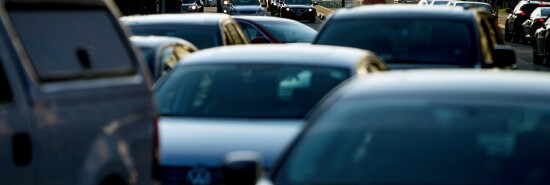
You’re shifting out of your lane too early in traffic
Timothy P. Carney
Video Embed
Politeness and efficiency are often at odds. In most cases, civilization means choosing politeness over efficiency, and our current culture errs too much in the direction of efficiency.
But in one specific case, we currently choose the inefficient course of action out of a misguided idea of politeness or orderliness, and the consequence is delay and inconvenience.
REPUBLICAN DEBATE: RNC ANNOUNCES THE EIGHT GOP 2024 CONTENDERS WHO MADE THE CUT
I’m talking about merging in traffic when a lane is closing.
Say there’s roadwork, and the right lane is closed. Or maybe the highway simply narrows and goes from three lanes to two.
If traffic is light and cars are moving quickly, it makes sense to get over into the next lane at the first opportunity. But often, a lane closure or highway narrowing will cause congestion and a slowdown. This is the case in which drivers tend to get over too quickly and assume wrongly that anyone who doesn’t get over right away is being rude or overly aggressive.
It can seem that everyone who gets over right away is getting in line in an orderly and selfless manner, and thus if someone zooms by those folks in the closing lane and gets over at the last second, that zoomer seems to be cutting the line.
Often the drivers who got over early will resent the last-minute merger. Sometimes, they’ll refuse to allow that car to merge. Often, a driver will start straddling the dashed line, taking up two lanes, believing he is enforcing good behavior by preventing cars from passing anyone in the closing lane.
The sentiment is understandable. This is what I believed when I began driving. But it’s actually not sensible in slow traffic. If everyone feels compelled to get over as soon as they know the lane closes up ahead, you are effectively reducing available lane miles. You are crowding all the cars onto less pavement, which means you are worsening congestion.
If everyone in the closing lane stayed in until right before the closure, and everyone in the open lane let them in at this point, you would eliminate the awkwardness that causes resentment: The late mergers wouldn’t be zooming past anyone, as there would be about the same number of cars in each lane, and thus traffic in the two lanes would be moving at about the same pace, which is perfect for merging.
This doesn’t apply in an exit-only (or turn-only) lane. And again, it doesn’t apply when there’s no congestion.
CLICK HERE TO READ MORE FROM THE WASHINGTON EXAMINER
The video below explains it nicely.
Video Embed
Again, efficiency isn’t the only virtue in life. But in travel, efficiency, which means everyone gets where they are going faster, is often the highest form of politeness.
